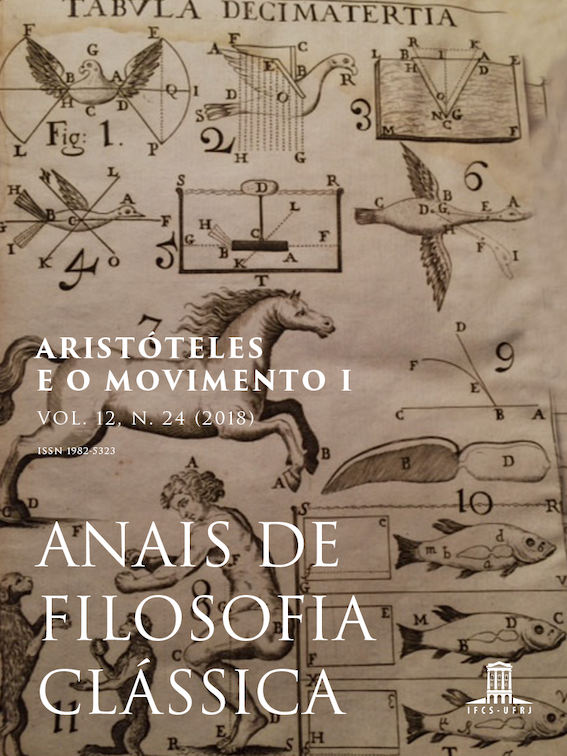Alexandre dʼAphrodise et la κίνησις ἀναίτιος
DOI:
https://doi.org/10.47661/afcl.v12i24.26084Keywords:
Alexander of Aphrodisias, Aristotle, Stoics, anti-déterminism, causality, uncaused movement.Abstract
Alexander of Aphrodisias has defended an aristotelian conception of responsability, particularly in his treatise On Fate, which presents "Aristotle's doctrine about fate and what depends on us" (De fato, 1), and in some texts of Mantissa or Quaestiones. This defence led him to reiterate traditional anti-determinist arguments (for example the argument by legal, moral and social consequences) as well as to propose new ones.
Among his rather creative and bold arguments, we can include one that admits the existence of a movement without cause, kinesis anaitios. This point is developed in Mantissa XXII, through a passage whose authenticity is highly discussed. I will attempt to show that, even if this text cannot be attributed to Alexander with certainty, it echoes some genuine alexandrian arguments, developed in the treatise On Fate.
Downloads
References
Sources : éditions et traductions
Alexandri Aphrodisiensis Praeter Commentaria Scripta minora. De anima cum mantissa, ed. I. Bruns, Supplementum Aristotelicum, vol. II, pars 1. Berlin: G. Reimer, 1887.
Alexandri Aphrodisiensis Praeter Commentaria Scripta minora. Quaestiones, De Fato, De Mixtione, ed. I. Bruns, Supplementum Aristotelicum, vol. II, pars 2. Berlin: G. Reimer, 1892.
Alexandri Aphrodisiensis In Aristotelis Metaphysica Commentaria, ed. M. Hayduck. Berlin: G. Reimer, 1891.
On Fate, text, translation and commentary by R. W. Sharples. London: Duckworth, 1983.
Traité du Destin, texte établi et traduit par P. Thillet. Paris: Les Belles Lettres, CUF, 1984.
Il Destino, a cura di C. Natali, prefazione, introduzione, commento, bibliografia e indici. Milano: Rusconi, 1996. Seconda edizione riveduta: Sankt Augustin: Academia Verlag, 2009.
De anima libri mantissa, a new edition of the Greek text with introduction and commentary by R. W. Sharples. Berlin/New York: De Gruyter, 2008.
Aristote. Physique, traduction et présentation par P. Pellegrin. Paris: Flammarion, GF, 2000.
Aristote. Métaphysique, présentation et traduction par M.-P. Duminil et A. Jaulin. Paris: Flammarion, GF, 2008.
Aristote. Éthique à Nicomaque, traduction et présentation par R. Bodéüs. Paris: Flammarion, GF, 2004.
Études
BÉNATOUIL, Th. Échelle de la nature et division des mouvements chez Aristote et les Stoïciens. Revue de métaphysique et de morale, 48/4, 2005. p. 537-556.
BOBZIEN, S. Determinism and Freedom in Stoic Philosophy. Oxford: Oxford University Press, 1998.
DONINI, P. L. Tre Studi sullʼAristotelismo del II secolo d.C. Torino/Milano/Genova: G. B. Paravia & C., 1974.
FAZZO, S. Aristotelismo e antideterminismo nella vita e nellʼopera di Tito Aurelio Alessandro di Afrodisia. In: NATALI, C.; MASO, S. La Catena delle cause. Determinismo e antideterminismo nel pensiero antico e in quello contemporaneo. Amsterdam: Hakkert, 2005. p. 269-295.
LEFEBVRE, D. “Extrait de ce que dit Aristote sur ce qui dépend de nous”. Supplément au traité De lʼÂme (De anima libri mantissa, XXII, CAG, II/1, 169, 33-172, 15). In: LAURENT, J.; ROMANO, C. Le Néant: contribution à lʼhistoire du non-être dans la philosophie occidentale. Paris: Presses Universitaires de France, 2006. p. 104-117.
LONG, A. A. Stoic determinism and Alexander of Aphrodisias De fato (I-XIV). Archiv für Geschichte der Philosophie, 52, 1970. p. 247-268.
SHARPLES, R. W. Responsibility, chance and not-being (Alexander of Aphrodisias Mantissa 169-172). Bulletin of the Institute of Classical Studies, 22, 1975. p. 37-64.


